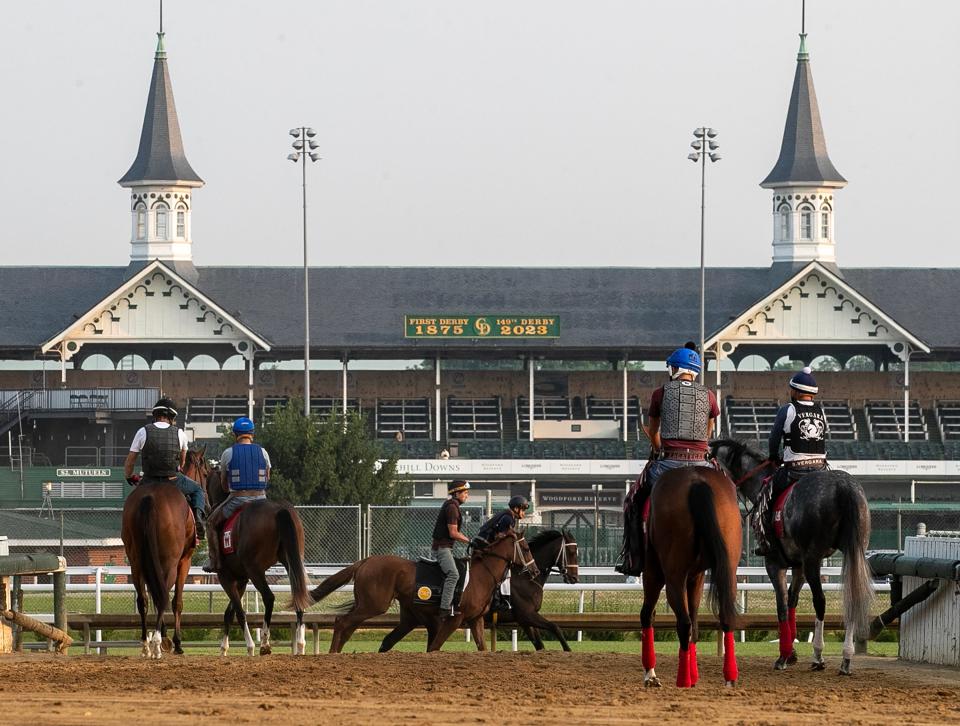Churchill Downs reverses one safety initiative implemented following deaths at Spring Meet

Churchill Downs announced Thursday it would roll back one of the safety initiatives put in place following the deaths of 12 horses in the Spring Meet.
When racing resumes at the famed track in September, every owner and trainer will again receive a payout each time their horse runs, regardless of finish.
During a Kentucky Thoroughbred Fund Advisory Committee meeting, Austin Schmitt, vice president of finance for Churchill Downs, said when racing returns to Churchill Downs on Sept. 14, purse payouts will resume from first through last place.
When the safety initiative was announced to horse trainers during an emergency town hall meeting on the backside of Churchill Downs in May, many wondered how they would cover their racing expenses: which just on race day can include overtime for employees, starting fees, jockey mount fees and more.
"Although I don't think it was their intent, I was afraid that the original action they took could be misinterpreted as an assignment of liability for the unusual spike in fatalities this spring to trainers and owners," said Ron Moquett, who raced King Russell in the 149th running of the Kentucky Derby and is a member of the Horseracing Integrity and Safety Authority's (HISA) horsemen advisory committee. "I'm happy that they now understand that Churchill and horsemen are partners in the safety of these animals."
Churchill Downs began paying sixth through last place, according to Equibase, at the 2009 Spring Meet. The amount paid depended on the total purse.
The Courier Journal took an in-depth look at Churchill Downs safety initiatives that a source with intimate knowledge of the initiatives said were "low-hanging fruit" for the racetrack to release following the deaths of the Derby Dozen during its spring meet, which was eventually stopped and moved to Ellis Park.
"We're thrilled with that decision because all owners have a certain expense in running a horse," said Rick Hiles, Kentucky Horsemen's Benevolent and Protective Association president, in a statement. "We are really thrilled that Churchill has stepped up to make that decision, which we disagreed with from the start."
"We support reverting back," said Chauncey Morris, Kentucky Thoroughbred Association executive director.
An analysis done by The Courier Journal found that before the track closed and moved its meet to Ellis Park, the average field size of a race was about eight horses. That means three owners/trainers would longer get paid. However, they still need to cover a long list of bills, including the jockey who rode the horse and the non-regulatory vet who checked the horse before the race.
"Who is that protecting?" said a trainer during a morning workout on the backside. "You tell me any person who wants to see a decrease in their pay who wouldn't be upset about it."
And of the 188 races that ran during the Spring Meet in Louisville this year, only 57 included a field of 10 or more horses.
Now, owners and trainers who may not have a good day at the track will not have to be as concerned about how to cover the ever-rising cost of owning and racing a thoroughbred.
"It's never too late to do the right thing," Moquett said.
Stephanie Kuzydym is an enterprise sports reporter, with a focus on the health and safety of athletes. She can be reached at skuzydym@courier-journal.com. Follow her for updates on Twitter at @stephkuzy.
This article originally appeared on Louisville Courier Journal: Churchill Downs reverses safety initiative ahead of September meet

